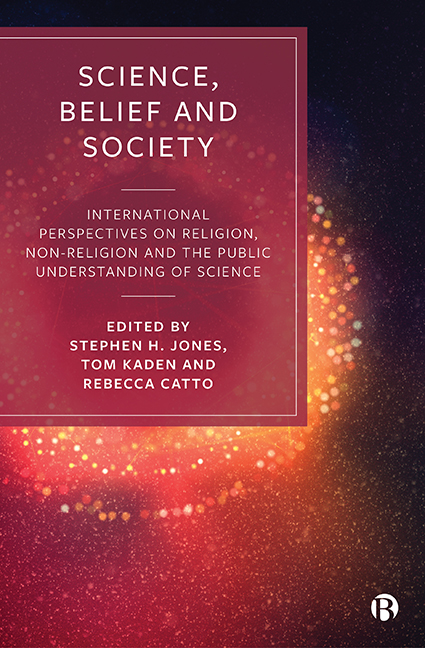 Science, Belief and Society
Science, Belief and Society Book contents
- Frontmatter
- Contents
- List of Figures and Tables
- Notes on Contributors
- Editors’ Acknowledgement
- Foreword
- Editors’ Introduction: Science, Belief and the Sociological Tradition
- PART I Methodological Challenges in the Study of Science and Belief
- PART II Belief in the Study of Science and Technology
- PART III Science, Culture and Non-religion
- PART IV Religion, Conflict and Moderation
- Conclusion: Future Directions in the Sociological Study of Science and Belief
- Index
12 - Discourses on Science and Islam: A View from Britain
Published online by Cambridge University Press: 27 April 2022
- Frontmatter
- Contents
- List of Figures and Tables
- Notes on Contributors
- Editors’ Acknowledgement
- Foreword
- Editors’ Introduction: Science, Belief and the Sociological Tradition
- PART I Methodological Challenges in the Study of Science and Belief
- PART II Belief in the Study of Science and Technology
- PART III Science, Culture and Non-religion
- PART IV Religion, Conflict and Moderation
- Conclusion: Future Directions in the Sociological Study of Science and Belief
- Index
Summary
Introduction
In this chapter, I explore the discourses on Islam and science that are most prevalent in contemporary Britain. There is a relative lack of sociological literature on Islam/Muslims and science, and my intention in this chapter is to join some dots and highlight some gaps by providing the reader with relevant background, presenting some preliminary data and discussing problems and possibilities for future research.
I begin by considering the prevailing discourse among non-Muslims, but the majority of the chapter is dedicated to exploring discourses on science and Islam among Muslims in Britain themselves. Key to understanding the popular discourses on science and Islam is the importance of da’wah – Muslim missionary activity – and the South Asian reform movements influential in shaping Islam in Britain today. I therefore briefly outline the history of Muslims in Britain and then consider the views of reformist Muslim intellectuals and more recent popularizers who have been influential in the formation of ‘Islam and science’ discourses. I then present data gathered from focus group sessions conducted with Muslims of South Asian heritage who are actively engaged with Islamic institutions in Britain. Next, I use survey data to explore some of the themes raised in focus groups, and make suggestions for both qualitative and quantitative work on this topic in the future.
Science and Islam: anti-religious discourses
‘All the world's Muslims have fewer Nobel Prizes than Trinity College, Cambridge. They did great things in the Middle Ages, though’ – so tweeted Richard Dawkins in August 2013. He chose to tweet this on Eid al-Fitr, the most important religious holiday for Muslims worldwide, which marks the end of the month of Ramadan. The tweet prompted widespread criticism, with, for example, one commentator making the point that comparing a specialized academic institution to all the world's Indians, or all the world's Chinese, would also render the statement true and that this was ‘agenda dressed up as fact’ (Malik, 2013). Dawkins continued to defend his statement, tweeting several more times during the day in the same vein. In a follow-up post on his website, he claimed that this tweet was a reaction to the claims that ‘the Qur’an anticipated modern science’ and ‘Muslim scholars kept the flame of Greek learning alight while Christendom wallowed in the Dark Ages’.
- Type
- Chapter
- Information
- Science, Belief and SocietyInternational Perspectives on Religion, Non-Religion and the Public Understanding of Science, pp. 263 - 288Publisher: Bristol University PressPrint publication year: 2019


